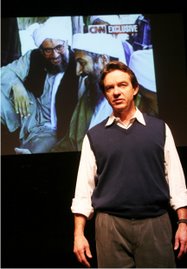Here are, in his own words and ours, four good reasons why we think Thompson will make, if not an immoral president, then at least an unhelpful one:
CLIMATE CHANGE
"Some people think that our planet is suffering from a fever. ... NASA says the Martian South Pole’s ‘ice cap’ has been shrinking for three summers in a row. Maybe Mars got its fever from earth. If so, I guess Jupiter’s caught the same cold, because it’s warming up too, like Pluto. This has led some people, not necessarily scientists, to wonder if Mars and Jupiter, nonsignatories to the Kyoto Treaty, are actually inhabited by alien SUV-driving industrialists who run their airconditioning at 60 degrees and refuse to recycle." -- March 22, ABC Radio.
Damage to the environment due to rapid climate change is both real and acknowledged as real by a vast consensus of scientists.
We're not sure how candidate Thompson plans to address environmental damage, but we firmly excoriate him for opting to mince words about such a vital problem, make silly suggestions about Jupiterian SUV-driving, and insinuate that the Bush administration's refusal to ratify the Kyoto Protocols is somehow good for us.
If Mr. Thompson wins, we can only hope he will think more lucidly about the future of our planet.
(Or, if he has no interest in this increasingly hot, increasingly crowded, hurricane-riddled planet, he can move to another one. We suggest Mercury.)

TAXES
"President John F. Kennedy was an astute proponent of tax cuts and the proposition that lower tax rates produce economic growth. Calvin Coolidge and Ronald Reagan also understood the power of lower tax rates and managed to put through cuts that grew the U.S. economy like Kansas corn. Sadly, we just don’t seem able to keep that lesson learned." -- April 14, The Wall Street Journal.
While targeted tax cuts may indeed help some of us, some of the time (check out Bill Richardson's past and proposed cuts), the country overall is lucky to have not kept learned "that lesson" -- the lesson of taxing those who can afford to be taxed, so that we can build roads, keep schools open, etc.
A self-styled Federalist, Thompson plans to follow in George W. Bush's footsteps and make the rich richer and poor poorer. We doubt that this strategy is good for anyone.
(The rich can only spend so much money in their lifetimes. But perhaps Thompson's Jupiterian friends -- he also makes frequent reference to "dwarf planets," perhaps in an effort to make Jupiter feel bad about its size -- can find a way for the rich to continue their spending posthumously. Perhaps by buying up dwarf planets...)
Separation of Church and State
Thompson has concerns of federal judges deciding "social policy." "Many federal judges seem intent on eliminating God from the public schools and the public square in ways that would astound our founding fathers. We never know when a five to four Supreme Court decision will uphold them. They ignore the fact that the founders were protecting the church from the state and not the other way around." -- The National Review.
We stand by a government that is entirely, 100% divorced from expressions of any particular faith.
The various odious, gay-bashing, abortion-for-raped-teens-denying pseudo-religions espoused as Truth by so many conservatives (among them Fred Thompson) should have no greater or lesser standing, in the eyes of the state, than Islam, Judaism, Yazidism, Wicca, atheism, Scientology, Yo-ism, or subGenius-ism.
Courts do not need to post the ancient tenets of the Abrahamic God in sight of accused criminals who may or may not believe in them; schools needn't trespass on the minds of young capitalist, imperial Americans than they already do.
(Jupiterists, of course, should be burned at the stake, if we can only figure out how to tie-down their fifty undulant tentacles long enough to light the kerosene-soaked witch-sticks below them. Amen.)
Torture
"I doubt, for example, that our television networks have spent as much time exposing the horrors of life for millions of women in pre-liberation Iraq and Afghanistan as they've spent covering Abu Ghraib. For some reason, everyday atrocities such as the endemic beatings, honor killings and forced marriages of women just don't seem to be newsworthy." -- a Thompson essay for the American Enterprise Institute.
We feel that this statement is so obviously antithetical to good thinking, good government -- to sanity -- that it needs no further amendment.
Please vote; please don't vote for Fred Thompson.






